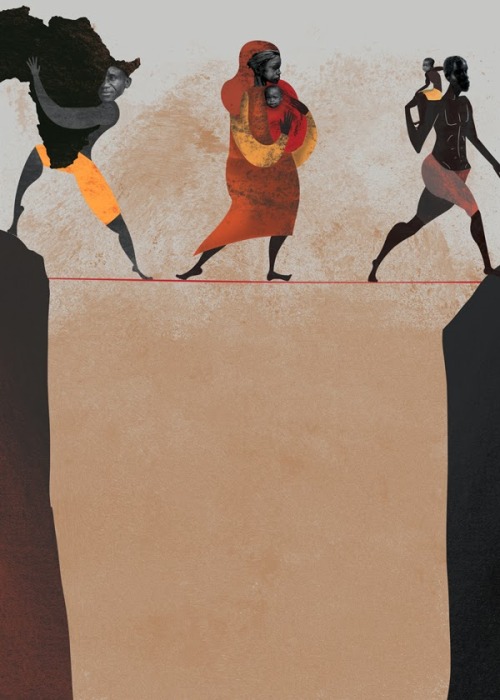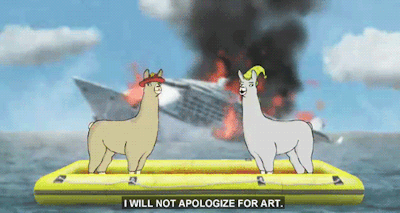http://bombmagazine.org/article/2948/junot-d-az Junot Diaz on Science Fiction and People of Color:
And I’ve definitely been wanting to write science fiction/fantasy, to write genre, to use some of those models to strike out in (for me at least) new directions.
Why this continued commitment to genres? So much of our experience as Caribbean Diasporic peoples, so much of it, exists in silence. How can we talk about our experiences in any way if both our own local cultural and the larger global culture doesn’t want to talk about them and actively resists our attempt to create language around them? Well, my strategy was to seek my models at the narrative margins. When I was growing up those were the narratives that most resonated with me and not simply because of the “sense of wonder” or because of the adolescent wish fulfillment that many genre books truck in. It was because these were the narratives that spoke directly to what I had experienced, both personally and historically. The X-Men made a lot of sense to me, because that’s what it really felt like to grow up bookish and smart in a poor urban community in Central New Jersey. Time-travel made sense to me because how else do I explain how I got from Villa Juana, from latrines and no lights, to Parlin, NJ, to MTV and a car in every parking space? Not just describe it but explain the missing emotional cognitive disjunction? I mean, let’s be real. Without shit like race and racism, without our lived experience as people of color, the metaphor that drives, say, the X-Men would not exist! Mutants are a metaphor (among other things) for race, and that’s one of the reasons that mutants are so popular in the Marvel Universe and in the Real. I have no problem re-looting the metaphor of the X-Men because I know it’s my silenced experience, my erased condition that’s the secret fuel that powers this particular fucking fantasy. So if I’m powering the ship, at a lower frequency, I’m going to have a say in how it’s used and in what ports of call it stops.
For another example, we have as a community been the victim of a long-term breeding project—I mean, that was one component of slavery: we were systematically bred for hundreds of years—but in mainstream literary fiction nobody’s really talking about breeding experiments. If you’re looking for language that will help you approach our nigh-unbearable historical experiences you can reach for narratives of the impossible: sci-fi, horror, fantasy, which might not really want to talk about people of color at all but that takes what we’ve experienced (without knowing it) very seriously indeed. Shit, they’ve been breeding people in sci-fi since its inception (The Island of Doctor Moreau) and the metaphors that the genres have established (mostly off the back of our experiences as people of color: the eternal other) can be reclaimed and subverted and expanded in useful ways that help clarify and immediate-ize our own histories, if only for ourselves. To quote Glissant again: this time that was never ours, we must now possess. Because it certainly has no problem possessing us any time it wants.
Sunday, March 30, 2014
Drake fux with Turrell.
Recently Hyperallergic reported that rapper Drake was interested in purchasing a work by renowned light/perceptual artist James Turrell. There have also been reports that a 'sign' that the art world bubble is about to burst is in the citation of artworks in hip-hop lyrics. While this is not a new phenomenon I have noticed it more often in younger artists' work and recent songs--from A$ap Rocky to HOVA and Kanye.
The loaded insinuations around hip-hop and the art world have been rather problematic and had connotations uncomfortable to grapple with that relate to the nature of the institutions making up the art world, and how deeply entrenched within those institutions is the idea of "high culture" and being a beacon of light onto the ("less"-enlightened) masses.
While I am fully in support of the arts as a medium for human expression, the disconnect between the rather insular art/museum world and the community, despite efforts on both parties' parts, continue to elude the best experts and art lovers. Additionally, art doing away with the supposed disconnect between high and low skillfully navigates both worlds but is not often willing to admit the cultural products of people of color (or other 'niches,' for example hip-hop, when in the highest of the highest echelons and recognition, that comes to mind). Could you imagine Richard Hamilton or Andy Warhol's most famous works incorporating, say, images from Ebony Magazine, or multiples of Chuck Berry instead of Elvis?
Having been fully in under-funded and underprivileged circles that admire production in an authentic way of people of color in an arts capacity, and well-funded and privileged circles that admire production from similarly privileged circles, the problem of 'ne'er shall the two meet' is seemingly intractable. Now that this problem's become more notable from articles insinuating that hip-hop (read: low/mass/nonwhite/black culture) having a handle on art (or Sean Combs re-re-nee Puff Daddy) means a death knell is sounding for *The* Art World Proper (It may be noted that there are those within hip-hop noting Jay-Z's Abramovic-heavy-art-world-forays were possibly a sign that his hip-hop apex is over, as well).
The loaded insinuations around hip-hop and the art world have been rather problematic and had connotations uncomfortable to grapple with that relate to the nature of the institutions making up the art world, and how deeply entrenched within those institutions is the idea of "high culture" and being a beacon of light onto the ("less"-enlightened) masses.
While I am fully in support of the arts as a medium for human expression, the disconnect between the rather insular art/museum world and the community, despite efforts on both parties' parts, continue to elude the best experts and art lovers. Additionally, art doing away with the supposed disconnect between high and low skillfully navigates both worlds but is not often willing to admit the cultural products of people of color (or other 'niches,' for example hip-hop, when in the highest of the highest echelons and recognition, that comes to mind). Could you imagine Richard Hamilton or Andy Warhol's most famous works incorporating, say, images from Ebony Magazine, or multiples of Chuck Berry instead of Elvis?
Having been fully in under-funded and underprivileged circles that admire production in an authentic way of people of color in an arts capacity, and well-funded and privileged circles that admire production from similarly privileged circles, the problem of 'ne'er shall the two meet' is seemingly intractable. Now that this problem's become more notable from articles insinuating that hip-hop (read: low/mass/nonwhite/black culture) having a handle on art (or Sean Combs re-re-nee Puff Daddy) means a death knell is sounding for *The* Art World Proper (It may be noted that there are those within hip-hop noting Jay-Z's Abramovic-heavy-art-world-forays were possibly a sign that his hip-hop apex is over, as well).
on the entrenched value of hierarchy
While I don't consider myself to be very Lacanian, I enjoy the idea of jouissance (hence the blog name). That union of self with universe and the mother. From whence does hierarchy proceed following the non-sense that characterizes jouissance?
Hierarchical thinking and structure really contribute to some terrible things that have happened in our society and continue to happen--colonialist-imperialist domination of the minds and bodies, women defined in relation to men, etc. Is there some value to hierarchy that maximizes efficiency? Or does it inherently devalue persons as lesser than and more than each other--reducing them to capital, goods and services rendered? I want to say that we could do without the hierarchy...but, as many have witnessed and tried (and continue to try) to practice, democracy and egalitarian thinking is. just. hard.
the difficulty of being intersectional
Once you have finally begun to become comfortable in the box you've been boxed in, how do you branch out and reach out to other 'boxes'? How do you fortify coalitions without losing your own identity? How do you remain yourself without the box (Indeed, can you?). Within the Asian-American-Straight-Cis-Female box, I remain proud yet hesitant to rest on that pride as though it is more worthy than other prides, especially those with less privileges.
In my young adulthood I have finally grown comfortable in my own skin. I would note that Beyonce and Kanye West have also come to a point in their careers where they are free to do be who they want to be--they've established their careers enough to go off the cuff a bit. It's freeing, terrifying, and awesome. But we--all of us--have got to stay vigilant and remain educators and allies to those who aren't at that spot yet, as well as keep watch over our own privileges and ways we may be continuing oppression of other folks.
Friday, March 14, 2014
Subscribe to:
Posts (Atom)

